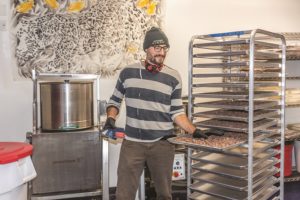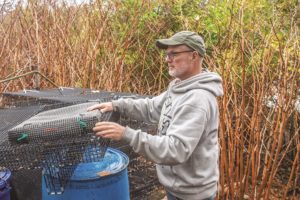WELLFLEET — For a few days of each week this summer, Will Barrio hung up his waders and went out to wire electrics.
Normally, Barrio would wait to grab his toolbelt until the darker days of winter crept in and his clam and oyster farm slowed down — or the weather made it unbearable to be on the water at Indian Neck.
But this summer was far from normal. Crippled markets in New York, where he usually sells his product, put a drag on his thriving shellfish business.
A lifelong resident of Wellfleet and third-generation shellfisherman, Barrio did what so many across America had to do this year: he worked the side hustle. But for Barrio, it wasn’t a scramble. He knew from a young age that, even though shellfish farming could be lucrative, it also put him at the mercy of turbulent markets and unpredictable environmental changes.
“All I can say is that I am happy I have another skill right now,” said Barrio.
Near the end of the 20th century, when the bluefin tuna population collapsed because of overfishing, the anglers who made a living off the highly-prized sushi fish had to adapt. The same story can be told about the cod fishery.
“We were forced to diversify a long time ago,” said Mike Rathgeber, longtime commercial fisherman and charter captain who also writes a seasonal column for the Independent.
When fishing is in your blood, he said, it’s hard to ever leave the water. Yet at one time or another, every fisherman knows, “I gotta do something else.”
After the cod and tilefish industries collapsed in the ’70s, Rathgeber worked as captain of a cargo tanker in the Gulf of Mexico. The oil business was booming then. But when that crashed, he followed another hot industry back north: whale watching in Provincetown, where he eventually started commercial fishing again. Rathgeber credits his success as a fisherman to his teaching career.
“My parents supported my dream to be a fisherman but told me I was going to be an educated fisherman, just in case,” said Rathgeber, now captain of the Cee-Jay. “That really saved me and enabled me to stay into it.”
Most all of those small figures that dot the Wellfleet mudflats at low tide, or that steam the fishing boats on the horizon, are fishermen and something else, too. The range is what’s interesting — they are carpenters, artists, charter captains, restaurateurs, teachers, and small-business owners.

When Josiah Mayo isn’t diving for lobsters off Herring Cove, he is standing behind the counter at Chequessett Chocolate, the bean-to-bar company he shares with partner Katie Reed. “It’s sort of an escape from fishing,” said Mayo, “but then again, fishing is an escape from that. I’ll go from being pissed on my boat to serving lattes in my cafe.”
After working a low tide in Wellfleet, Andrew Jacob spends his time painting murals, designing labels for local businesses, or selling his art online. “I make my living off of oystering, but my art really balances it out,” said Jacob. “Before, I was solely dependent on my art and at the mercy of each show, but now I have much more flexibility.”
Dave Stamatis, a retired cop and current commercial fisherman, keeps it all on the water, but with a twist. Every summer, Stamatis runs a charter business that combines commercial lobstering with charter fishing. With families on board, he pulls some of his 600 commercial lobster traps to sell later — while also teaching his customers about the industry and putting them on busting bass. Each trip is a double whammy.
All of these fishermen know the importance of keeping an ear to the ground. “It’s a constant process of trying to stay ahead of the curve,” said Rathgeber. “You always have that fear of not being able to fish anymore hanging over your head.”

In 2018, Alex Brown, a long-time lobsterman and shellfisherman, decided not to drop his traps for the first time in 25 years. New regulations will soon require lobstermen to use trawls — lines with multiple traps — to protect the endangered right whale.
“Fishing with trawls on my smaller boat would have been too dangerous for me, and it would’ve cost me a lot of money,” he said.
But he was ready for the transition. He hopped off his lobster boat, the Sea-Star, and walked out to his 30-year-old shellfish grant in Provincetown.
“I’d been thinking ahead for a long time,” said Brown.
Correction: In an earlier version of this story, Wellfleet oysterman and artist Andrew Jacobs was inadvertently referred to as Alex Jacob.



